|
|
 |
Fiche d'espèce de Copépode |
|
|
Siphonostomatoida ( Ordre ) |
|
|
|
Rataniidae ( Famille ) |
|
|
|
Ratania ( Genre ) |
|
|
| |
Ratania flava Giesbrecht, 1892 (F,M) | |
| | | | | | | Ref.: | | | Giesbrecht, 1892 (p.616, 774, Descr.F, figs.F); 1899 (p.22, Descr.F, figs.F); Farran, 1926 (p.296: Rem.); Rose, 1933 a (p.285, figs.F); Saraswathy, 1961 (p.142, figs.F,M, Rem.); 1966 (1967) (p.89); Owre & Foyo, 1967 (p.109, figs.F); Boxshall, 1979 (p.238, figs.F,M); Lapernat, 1999 (p.39, fig.: Md, Rem.); Boxshall & Halsey, 2004 (p.815, p.816: figs.F,M); Vives & Shmeleva, 2010 (p.408, figs.F,M, Rem.) | 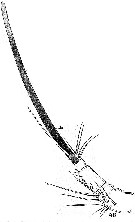 Issued from : W. Giesbrecht in Systematik und Faunistik der Pelagischen Copepoden des Golfes von Neapel und der angrenzenden Meeres-Abschnitte. – Fauna Flora Golf. Neapel, 1892. Atlas von 54 Tafeln. [Taf.48, Fig.46]. Female: 46, A1.
|
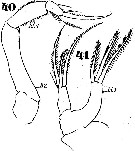 Issued from : W. Giesbrecht in Systematik und Faunistik der Pelagischen Copepoden des Golfes von Neapel und der angrenzenden Meeres-Abschnitte. – Fauna Flora Golf. Neapel, 1892. Atlas von 54 Tafeln. [Taf.48, Figs.40, 41]. Female: 40, A2; 41, Mx1.
|
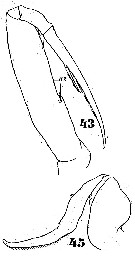 Issued from : W. Giesbrecht in Systematik und Faunistik der Pelagischen Copepoden des Golfes von Neapel und der angrenzenden Meeres-Abschnitte. – Fauna Flora Golf. Neapel, 1892. Atlas von 54 Tafeln. [Taf.48, Figs.43, 45]. Female: 43, Mxp; 45, Mx2.
|
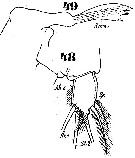 Issued from : W. Giesbrecht in Systematik und Faunistik der Pelagischen Copepoden des Golfes von Neapel und der angrenzenden Meeres-Abschnitte. – Fauna Flora Golf. Neapel, 1892. Atlas von 54 Tafeln. [Taf.48, Figs.48, 49]. Female: 48, left caudal ramus (dorsal); 49, Md.
|
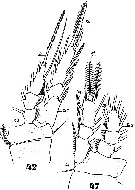 Issued from : W. Giesbrecht in Systematik und Faunistik der Pelagischen Copepoden des Golfes von Neapel und der angrenzenden Meeres-Abschnitte. – Fauna Flora Golf. Neapel, 1892. Atlas von 54 Tafeln. [Taf.48, Figs.42, 47]. Female: 42, P4; 47, P1.
|
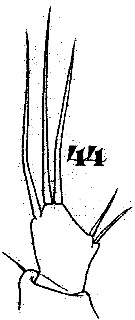 Issued from : W. Giesbrecht in Systematik und Faunistik der Pelagischen Copepoden des Golfes von Neapel und der angrenzenden Meeres-Abschnitte. – Fauna Flora Golf. Neapel, 1892. Atlas von 54 Tafeln. [Taf.48, Fig.44]. Female: 44, P5.
|
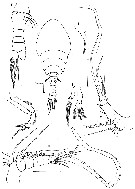 issued from : G.A. Boxshall in Bull. Br. Mus. nat. Hist. (Zool.), 1979, 35 (3). [p.239, Fig.17, E-K]; Female (from 18°N, 15°W): E, urosome (ventral); F, A1; G, A2; H, Md; I, Mx1. Male: J, habitus (dorsal). Scales 0.1 mm unless otherwise indicated.
|
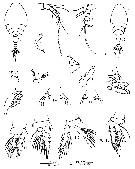 issued from : M. Saraswathy in Bull. centr. Res. Inst. Univ. Kerala, 1961, (C)8. [p.144, Fig.1]. Female (from Trivandrum coast, SW India): 1, habitus (dorsal); 2, A1; 3, A2; 4, Md; 5, Mx1; 6, Mx2; 7, Mxp; 8, Mx1, Mx2 and Mxp in situ; 9, ventral view of anterior end; 10-13, P1 to P4; 14, urosomal segment 1 with P5. Male: 15, habitus (dorsal); 16, A1; 17, urosomal segment 1 with P5. Nota: Giesbrecht has illustrated an elongated Md with a distinct strongly dentate gnathobase. In the present specimen Md is quite different from that of Giesbrecht, but is in complete agreement with the Md of other siphonostomes.. According to Giesbrecht, the 3rd segment of the endopod of P3 and P4 possesses only 2 setae, but in the present specimens the corresponding segment of P3 has 3 setae and for P4 only 2.
|
 issued from : M. Saraswathy in Bull. centr. Res. Inst. Univ. Kerala, 1961, (C)8. [p.143, Table]. Number of setae (Arabic numerals) and spines (Roman numerals) for the swimming legs P1 to P4. Si, Se, St: inner, outer and terminal seta of segments, respectively
|
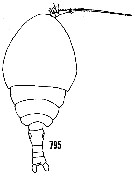 issued from : H.B. Owre & M. Foyo in Fauna Caribaea, 1, Crustacea, 1: Copepoda. Copepods of the Florida Current. 1967. [p.109, Fig.795]. After Giesbrecht (1892). Female: 795, habitus (dorsal).
|
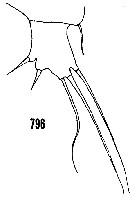 issued from : H.B. Owre & M. Foyo in Fauna Caribaea, 1, Crustacea, 1: Copepoda. Copepods of the Florida Current. 1967. [p.109, Fig.796]. Female: P5. Nota: Owre & Foyo point to numerous immature forms from 100-160 m at middday; 30-60 m and 156 m at midnight..
|
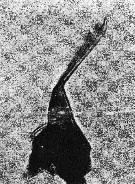 issued from : P.E. Lapernat & C. Razouls in Vie Milieu, 2002, 52 (1). [p.23, Pl. III, fig.5]. Md (from off Malta, Mediterranean Sea).
| | | | | Ref. compl.: | | | Sewell, 1948 (p.472, 506); C.B. Wilson, 1950 (p.318, Rem.); V.N. Greze, 1963 a (tabl.2); De Decker & Mombeck, 1964 (p.13); Shmeleva, 1964 a (p.1068); Mazza, 1966 (p.73); Pavlova, 1966 (p.45); Apostolopoulou, 1972 (p.329, 374); Björnberg, 1973 (p.356, 388); Deevey & Brooks, 1977 (p.156, tab.2, Station "S"); Kovalev & Shmeleva, 1982 (p.85); Saraswathy, 1982 (p.638, Rem., chart); Guangshan & Honglin, 1984 (p.118, tab., Rem.: p.165); Scotto di Carlo & al., 1984 (p.1044); Greze & al., 1985 (p.8); Scotto di Carlo & al., 1991 (p.271); Seguin & al., 1993 (p.23); Shih & Young, 1995 (p.75); Böttger-Schnack, 1995 (p.93) 1996 (p.1089); Lopez Salgado & Suarez Morales, 1996 (p.944); Hure & Krsinic, 1998 (p.80, 103); Suarez-Morales & Gasca, 1998 a (p.114); Lopez-Salgado & al., 2000 (tab.1); Lapernat & Razouls, 2001 (tab.1); Vukanic, 2003 (p.139, tab.1); Lan & al., 2004 (p.332, tab.1); Lo & al., 2004 (p.89, tab.1); Raybaud & al., 2008 (p.1765, Table A1); Licandro & Icardi, 2009 (p.17, Table 4); Mazzocchi & Di Capua, 2010 (p.430); Hsiao S.H. & al., 2011 (p.475, Appendix I) ; Zakaria & al., 2016 (p.1, Table 1, Rem.) | | | | NZ: | 9 | | |
|
Carte de distribution de Ratania flava par zones géographiques
|
| | | | | | | | | | | |  issued from : M. Saraswathy in J. Plankton Res., 1982, 4 (3). [p.635, Fig.2]. issued from : M. Saraswathy in J. Plankton Res., 1982, 4 (3). [p.635, Fig.2].
Distribution of P. abyssicola in the Indian Ocean.
Nota: Samples obtained from the upper 200m water colum at different season. |
| | | | Loc: | | | South Africa (E), Cape Verde Is., Barbados Is., G. of Mexico, Florida, off Bermuda (Station "S"), Sargasso Sea, ? W Ireland, Ibero-moroccan Bay, Medit. (Alboran Sea, Algiers, G. of Lion, Ligurian Sea, Napoli, Strait of Messina, off Malta, S Adriatic Sea, Ionian Sea, Aegean Sea, W Egyptian coast, Lebanon Basin), Red Sea, Arabian Sea, SW India, Indian, Bay of Bengal, Philippines, China Seas (East China Sea), Taiwan (E, N, Mienhua Canyon), Pacif. (W equatorial), N Chile | | | | N: | 36 | | | | Lg.: | | | (46) F: 1,2; (138) F: 1,2-1; M: 1,2-1; (340) F: 1,4; M: 1,2; (530) F: 1,1; M: 1; (716) F: 1,2; (718) F: 1,1; M: 1; {F: 1,00-1,40; M: 1,00-1,20} | | | | Rem.: | méso-bathypélagique.
Caractéristiques morphologiques female: A1 avec 5 segments. Longueur du prosome supéririeur de près du double de celle de l'urosome.
Caractéristiques morphologiques male: A1 avec 7 segments.
Voir aussi les remarques en anglais | | | Dernière mise à jour : 09/12/2020 | |
|
|
 Toute utilisation de ce site pour une publication sera mentionnée avec la référence suivante : Toute utilisation de ce site pour une publication sera mentionnée avec la référence suivante :
Razouls C., Desreumaux N., Kouwenberg J. et de Bovée F., 2005-2026. - Biodiversité des Copépodes planctoniques marins (morphologie, répartition géographique et données biologiques). Sorbonne Université, CNRS. Disponible sur http://copepodes.obs-banyuls.fr [Accédé le 03 mars 2026] © copyright 2005-2026 Sorbonne Université, CNRS
|
|
 |
 |















